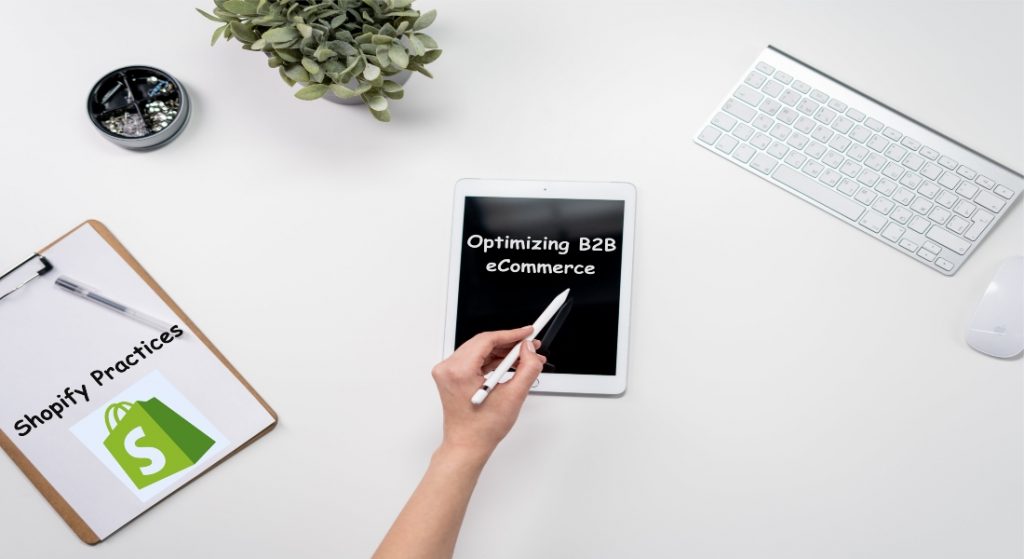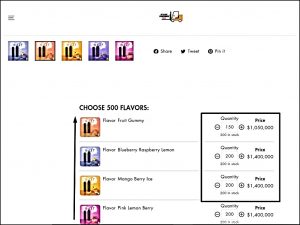
Statista predicts that by 2027, the worldwide B2B eCommerce market will be worth $20.9 trillion.
The growth of B2B eCommerce in recent years has been phenomenal. Increased interest in eCommerce can be related to the widespread adoption of digital technologies and the current digital epidemic.
However, establishing an online storefront is just the beginning; there are many things to do. The same thing goes for eCommerce and B2B businesses as well.
To achieve lasting success in B2B eCommerce, companies must do more than just implement the latest and greatest technologies and platforms. In such a case, some best practices have no alternative.
This article will examine some B2B eCommerce best practices for Shopify that a businessman can apply at Shopify. First, look at the overview of an eCommerce B2B business model.
What is eCommerce B2B Business Model?
The term “B2B eCommerce” refers to online transactions between businesses. B2B business models are different than B2C. Sales cycles in the B2B eCommerce model are typically longer because of different issues, such as the involvement of more stakeholders, larger order volumes, and higher expenditures.
For example, in a B2B business, it is common practice to sell in bulk to other businesses via eCommerce. B2B buyers frequently buy products from well-known B2B wholesale suppliers, manufacturers, or distributors and then sell them to resellers in bulk or small volume.
What is the Differences Between B2B and B2C?
B2B and B2C both are two different business models. Let’s find out the core differences between them.
- Both Business Owners Take Buying Decisions Differently
- Both Businesses Have Different Purchasing Cycles
- B2B and B2C Buyers’ Focus is Different
- Pricing, Product Quantity, and the Ordering Process are Different in both cases
- The shipping Factor is also Different for Them
Difference 1: Both Business Owners Take Buying Decisions Differently
B2C businesspeople usually do impulsive buying. On the other hand, B2B businessmen do logical buying. There is a good reason behind it.
Many factors influence the purchasing decisions of B2B and B2C customers differently. Compared to consumer purchases, those made between businesses tend to be larger in quantity and value.
Both B2B and B2C customers have different motivations for making purchases. Consumers may be affected more by their feelings and brand reputation, but B2B customers tend to make more logical and calculated choices.
In B2C transactions, customers buy a small number of products because the buyer could be a single person or a fixed group of people. But, in B2B transactions, more people become involved in buying. As a result, companies need to modify their approaches to advertising and selling to reflect these shifts in customer behavior.
Difference 2: Both Businesses have Different Purchasing Cycles
The B2B buying cycle is typically lengthy and complex. This is because both the seller and the buyer have multiple roles and responsibilities to play in the transaction. However, in B2C businesses, the buying process is simpler because the buyer is solely responsible for his purchase. As a result, the B2C buying cycle is quite fast.
Difference 3: B2B and B2C Buyers’ Focus is Different
While making a purchase, B2C customers evaluate available options very lightly according to their own specific requirements and preferences. The procedure emphasizes the customer’s needs and how the item can be used.
In contrast, B2B businesses care most about the bottom line. Potential buyers will consider a number of factors, such as how soon their inquiries can be addressed, how much information is at their fingertips, how simple the transaction will be, etc.
Difference 4: Pricing, Product Quantity, and the Ordering Process are Different in both cases
Pricing, product quantity, and ordering process concerns are really different between B2B and B2C. Because B2B buyers usually buy products in bulk, and B2C buyers buy products in small amounts.
A bulk order process usually requires a huge product cost, including a complex ordering process. On the other hand, B2C customers buy a really small number of products, so they do not need to perform a complex ordering process.
Difference 5: The shipping Factor is also Different for Them
In a B2B business, shipping costs play a huge role. Businessmen usually try to figure out the way of how they can cut their shipping costs. When a wholesale buyer orders a huge number of products together, their shipping costs also rise according to their production volume.
But in a B2C business, a customer can order a minimum amount of product that does not require high shipping costs.
Details About B2B Business Model – 3 Types Explained
Model 1: Wholesale B2B
The term “B2B wholesale” refers to the practice of selling in large quantities to other businesses rather than to end users.
Typically, wholesalers purchase goods in bulk directly from manufacturers or other wholesale suppliers. They buy goods in bulk from manufacturers, hold them in warehouses, and then resell the goods to retailers and wholesalers for a profit.
Wholesalers can increase their sales volume and average order value by concentrating on B2B rather than direct consumer sales. Businesses find wholesalers useful since they can buy a huge amount of products from one store.
Model 2: B2B2C
B2B2C stands for business-to-business-to-consumer. In this business model, two organizations supply complimentary items or services to reach the same end consumer. This type of corporate partnership frequently exists between a business that provides items or services and a business that manages client transactions, such as customer care, order fulfillment, and shipment.
So in a simple sentence, we can say that B2B2C models are a form of collaboration between manufacturers and delivery service providers.
The B2B2C business model helps brands reach more customers efficiently, enhance the customer experience, and boost both companies’ revenue.
The B2B2C model also generates new business prospects for intermediary enterprises and brand expansion for both parties. Over the past few years, B2B2C has become increasingly common because of the dramatic shift toward online shopping.
Model 3: B2B2B
The B2B2B model is becoming more popular these days. It encourages businesses to move from direct-to-consumer (D2C) to wholesale and B2B or to add these strategies to their current B2C models.
For example, many popular online stores like Walmart or Amazon started their company in such a way that they sell products directly to consumers.
Why People Should Start B2B Business?

Reason 1- B2B Has a Massive Sales Volume
As we already know, in a B2B business model, a customer can buy products in bulk. A bulk order is a reference to a large purchase. When a huge buying event happens, the B2B business owner gets the chance to sell a huge amount of product quickly.
B2B businesspeople are becoming more sophisticated these days. Businesses that are doing business on Shopify use a third-party bulk order app to maintain their inventory, create bundles, put restrictions on orders, and much more.
When a B2B wholesaler buys products in bulk, they usually sell more products than a B2C business.
Reason 2- B2B Business is Good to Reach Huge Market
Wholesale business between businesses has the potential to reach a huge customer base. Targeting other businesses as consumers can lead to accessing a much larger market because B2B transactions typically involve larger volumes of goods and services.
In the United States, B2B eCommerce sales are projected to hit $1.8 trillion in 2023, making up 17% of the overall B2B sales in the country, according to a study by Forrester Research.
Moreover, relationship development with other organizations can be especially beneficial because of the longer sales cycles and more complex decision-making processes inherent in B2B transactions.
You may build a consumer base that will continue to buy from you in the long run if you network with other firms and give them what they need. If you’re looking to expand your customer base and foster long-term partnerships, B2B wholesale is the way to go.
The number of eCommerce wholesaler buyers is huge, and it is increasing day by day, especially on Shopify. As a result, grabbing some potential customers in the B2B business means it will make a huge difference in the company’s brand visibility in the large market.
Reason 3- B2B Business Model Brings Repeat Customers
Running a wholesale business on eCommerce increases the chances of getting repeat customers. In eCommerce, finding a reliable wholesale supplier is quite challenging. As a result, when wholesale buyers find a reliable source of wholesale distributors, they try to buy from them repeatedly.
BigCommerce found that suppliers who excelled at customer service had an 80% response rate from B2B eCommerce buyers who said they would buy again.
Repeat customers have a good impact on a business and also increase customer retention. The chance of getting repeated buyers in B2B business is quite higher than in B2C business. Building lasting relationships with their clients is key to generating repeat business for B2B companies.
Moreover, it includes keeping lines of communication open, being ready to work together to find solutions, and taking part in tasks everyone is responsible for. S
elling to other businesses has the added benefit of fostering relationships with customers that are mutually beneficial, which in turn boosts customer loyalty and word-of-mouth advertising.
Why People Should Not Start B2B Business?
Reason 1- If there is a Lacking of Making Fixed Business Goals
Before you start an eCommerce business, you should have a clear idea of what you want your company to be. And B2B is just the same. If you don’t have a clear goal in mind, it can be hard to come up with a focused and effective business plan.
Having a well-defined business goal is essential for any types of business, but it’s especially important for B2B businesses. Because B2B businesses works with suppliers to manufacturers and try establish a presence in the market to gain loyal clients.
It takes time to build a good relationships with clients when it is about B2B business. Because the sales cycle of B2B is often longer than B2C.
Since there is no clear direction, it might be hard to make a corporate plan that fits with the company’s long-term goals.
Without a clear goal, a business that sells to other businesses risks putting its resources toward things that won’t help it meet the goals of its customers.
Both measuring performance and making choices based on data need a clear endpoint. B2B companies can track their success and make course corrections as needed if they have a clear goal. This lets businesses change course if they need to reach their goals faster.
Reason 2- May be the Businessperson is not Good at Making Marketing Plans
B2B businesses need a solid marketing strategy to build sustainable brand visibility. With a solid marketing strategy, lead generation, customer acquisition, and company expansion are easier for B2B companies. It’s also worth noting that marketing strategies for B2B companies may differ from those of B2C companies.
If a businessperson in eCommerce is not well aware of the differences between these two business models, he will suffer. Business-to-business marketing (or B2B marketing) targets other companies instead of end users (or consumers).
So, understanding the target company’s problems and presenting the company’s solutions are essential parts of business-to-business marketing.
Lead generation tactics, including content marketing, SEO, email marketing, and social media marketing, should all be part of any B2B company’s marketing strategy. Account-based marketing, customer retention, and customer referral programs are all examples of strategies that can be used to strengthen bonds with current clients and prospects.
Reason 3 – He has not Enough Patience
It takes a lot of time, effort, and patience to build a successful B2B business model. Developing a solid product or service, cultivating a dedicated customer base, and creating brand value is quite lengthy in B2B than B2C.
A B2B company owner must be patience while making any strategic plans or investment in marketing. Because taking decision without thinking can raise up problems in a business. If they really want to grow their business they must keep patience and concentrate on revenue growth, customer satisfaction, CLV, AOV etc.
Building a successful business takes time, and there will be ups and downs that a B2B business owner must accept. B2B businesses can improve their chances of success by collecting as much relevant information about their rival as possible, analyzing it critically, and making any required plan modifications.
Best Practice of B2B eCommerce
- Allows Bulk Order
- Examine Buyer experience
- Focus on Shipping
- Offers a Great Customer Service
- Use Third-Party Application
Practice 1- Allows Bulk Order
Bulk Ordering in a B2B wholesale business at eCommerce is the goal of this business model. As wholesalers want to perform a big purchase at a time, offering them bulk orders could be a good initiative to satisfy them.
If you are a Shopify wholesale buyer, it only allows bulk orders up to a specific daily limit. Otherwise, your account will be temporarily disabled if you exceed this limit.
Practice 2- Examine Buyer Experience
As a best practice, B2B companies should analyze the purchasing process to learn more about their client’s needs and concerns. A successful company always includes interactions with its customers to improve the buyer experience.
By analyzing the buyer journey, B2B companies can find ways to enhance their sales and support operations. Which ultimately leading to happier customers who like to stick with them.
Moreover, to better serve their customers, stand out from the competition, and boostbrand’s overall reputation company should analysis customer’s journey from start to end.
Practice 3- Focus on Shipping
B2B companies can do well in marketplace by focusing on the shipping process. Because it an easy shipping process can easily turn into a usual customer into a loyal one. Shipping on time without issues enhance the client experience in a B2B business.
Making sure things are delivered on time and it is in an acceptable shape can boost customer loyalty, goodwill, and brand recognition.
Moreover, a B2B business can become advantageous over their competition by developing expertise in delivering product on time. In addition, a company’s standing in the market can improve if it earns a reputation for providing excellent shipping services.
Making shipping a major priority and implementing best practices like optimizing logistics, tracking shipments, and proactive client engagement. It can help business-to-business (B2B) organizations increase customer satisfaction, build a strong reputation, and grow their business activities.
Moreover, offering free shipping in bulk orders is also a good initiative in an eCommerce B2B business. Read this to know how free shipping increase sales.
Practice 4- Offers a Great Customer Service
Providing first-rate customer service is essential for business-to-business companies because it affects how many customers return and how much money they make.
Excellent customer service is especially important in business-to-business, where companies count on repeat business and referrals from satisfied clients. B2B companies may earn their clients’ loyalty and encourage them to do business with them again by delivering first-rate support.
Moreover, happy client is more likely to recommend the company to their friends and family, who may also become consumers. When a customer faces any problem, if the company solves it quickly, it creates a strong company image in the customer’s eyes. And we know making brand visibility in a B2B industry is quite tricky.
Additionally, with good customer service, B2B companies can boost income, retain and attract customers, and stand out from the competition by focusing on providing excellent customer service.
Practice 5 – Use Third-Party Application
When you are just entering the B2B wholesale industry, making the buying experience easy for your customers is mandatory. If you are just running a B2B wholesale business at Shopify, then you must know about the usage of third-party applications.
There are bunches of applications available at Shopify regarding B2B wholesale businesses. A B2B business-oriented application allows customers to order in bulk quickly. On the other hand, this sort of application is also helpful for businesspeople.
Some applications allow you to make bundles (mix and match, incremental quantity, pre-set bundle) and put restrictions (MOQ) on a product, which is really helpful for inventory management. Have a look how a helpful bulk order app looks like-

Here, we can see an illustration of a B2B wholesale bulk order app for Shopify. In the marked area, we can see a customer can easily order a good amount of products together, and the app allows the store owner to show different variants of the same product on one page. So this app can also be called a variant builder app for Shopify.
Bottom Line
In sum, B2B eCommerce offers a tremendous chance for companies to expand their customer bases and generate revenue. To utilize the chances practicing the mentioned ways is mandatory if you want to be successful in your Shopify B2B business.
